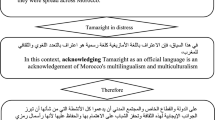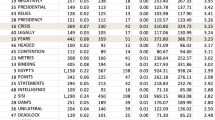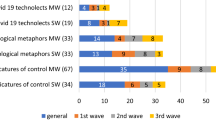Abstract
The article analyzes the verb representation of information sources in the political media discourse of the Chinese language, dedicated to the implementation of the Chinese foreign policy strategy One Belt, One Road (OBOR). The purpose of the article is to reveal the peculiarities of the verb representation of information sources in the OBOR Chinese political media discourse. Methods of discourse analysis, componential analysis, structural-semantic, descriptive, interpretive methods, as well as continuous sampling method were used to implement the objectives. The main material for the study was articles united by the “OBOR” topic presented on the pages of the online platform of The Zhenmin Zhibao 人民日报 - The Zhenmin Wang 人民网. The first stage of the study is related to the identification of information sources characteristic of the Chinese media discourse, and covering the topic of OBOR. The second stage of the study was the sampling of examples of verb combinations that represent sources of information within the meaning of indirect evidentiality ‘quotative’ and full citation. The third stage of the research was the identification of the verbs with which Chinese publicists formalize sources of information of indirect evidentiality. As a result, the study showed that the main sources of information in Chinese media texts can be divided into several groups: (1) persons (politicians and representatives of various organizations); (2) organizations (financial and trade, mass media); (3) documents (research results and statistics). The study showed that the OBOR Chinese media discourse is dominated by the references to the source of information related to the first group - persons (politicians, representatives of various organizations). Speeches of Chinese government officials and public agents play a significant role in the information support of the OBOR media discourse. Their representation in the text is carried out mainly by means of verbs of speech and mental activity. It is concluded that statements with the evidentiality meaning of ‘quotative’ is the most common way of presenting information in the OBOR Chinese-language discourse.
Access this chapter
Tax calculation will be finalised at checkout
Purchases are for personal use only
Similar content being viewed by others
References
Cheng, Zh., Li, Ya.: Renmin wang “yidai yilu” baodao de tedian yu youhua cel?e [Characteristics and Strategies of Optimizing Messages on the Subject “One Belt, One Road”]. In: Dongnan chuanbo [Southeast Communication], vol. 12, pp. 11–14. (2017). (in Chinese). https://doi.org/10.13556/j.cnki.dncb.cn35-1274/j.2017.12.005
Aikhenvald, A.Y.: Evidentiality. Oxford University Press, Oxford (2004)
Kozintseva, N.A.: Kategoriya evidentsial’nosti (problemi tipologicheskogo analiza) [The Category of Evidentiality (Problems of Typological Analysis)]. In: Voprosy Yazykoznaniya, vol. 3, pp. 92–104 (1994). (in Russian)
Plungian, V.A.: Types of verbal Evidentiality marking: an overview. In: Linguistic Realization of Evidentiality in European Languages/G. Diewald, E. Smirnova (Eds). De Gruyter Mouton, Berlin-New York, pp. 15–58 (2010)
Hu, Zh.: Yuyande kezhengxing [Evidentiality in Language]. In: Waiyu jiaoxue yu yanjiu [Foreign Language Teaching and Research], vol. 1, pp. 9–15 (1994). (in Chinese)
Verhees, S.: Opredeleniye kategorii evidentsialnosti [Defining Evidentiality]. In: Voprosy Yazykoznaniya, vol. 6, pp. 113–133 (2019). (in Russian). https://doi.org/10.31857/S0373658X0007549-2
Zhou, Ya., Mao, H.: Guonei yanjuxing yanjiu de keshihua fenxi [A Visualized Analysis on the Evidentiality Study in China]. In: Haerbin xueyuan xuebao [Journal of Harbin University]. Vol. 5, pp. 110–113. (2018). (in Chinese)
Reber, E.: Constructing evidence at prime minister’s question time: an analysis of the grammar, semantics and pragmatics of the verb see. In: Intercultural Pragmatics, vol. 11 (3), pp. 357–387 (2014)
Berlin, L.N.: Redundancy and markers of belief in the discourse of political hearings. In: Language Sciences, vol. 33(2), pp. 268–279 (2011)
Berlin, L.N., Prieto-Mendoza M.A.: Evidential embellishment in political debates during US campaigns. In: Intercultural Pragmatics, vol.11 (3), pp. 389–409 (2014)
Oishi, E.: Evidentials in Entextualization. Intercult. Pragmat. 11(3), 437–462 (2014)
Sbisa, M.: Evidentiality and Illocution. Intercult. Pragmat. 11(3), 463–483 (2014)
Ruskan, A.: Markers of Evidentiality in lithuanian newspaper discourse: cognitive grammar, functional and discourse-pragmatic perspectives. In: Evidentiality Revisited. Cognitive grammar, functional and discourse-pragmatic perspectives, pp. 271–295. John Benjamins Publishing Company (2017)
Liu, H.: Meiguo zhengzhiyu pian zhong de yanjuxing fenxi [Analysis of Evidentiality in American Political Discourse]. In: Xiandai jiaoji [Modern Communication], vol. 16, pp.18–19 (2017). (in Chinese)
Liu, H.: Teleisha Mei tuo’ ou yanjiang zhong de zhengzhi yupian yanjuxing fenxi [Analysis of Evidentiality of Public Discourse in the Public Speech of Theresa May About Brexit] In: Xiandai jiaoji [Modern Communication], vol. 5, pp.85–86 (2019). (in Chinese)
Mao, H.: “Zhengzhi huayu de qingtai yu yanjuxing yanjiu” pingjie [Review of the “Research on the Modality and Evidentiality of Political Discourse”]. In: Yuyan zhengce yu guihua yanjiu [Language Policy and Research Planning], vol. 2, pp.93–99 (2020). (in Chinese)
Zhou, Y., Xia, C.: Jiyu yanjuxing shijiaode guojia zhanl?e renji yiyi yanju [A Study of Interpersonal Meaning of National Strategy on the Basis of Evidentiality]. In: Shandong nongye gongcheng xueyuan xuebao [The Journal of Shandong Agricultural Engineering University], vol. 10, pp. 94–95 (2018). (in Chinese)
Astakhova, T.N.: Osobennosti ukazaniya na istochniki informacii v nemeckoyazychnom arkticheskom mediadiskurse [Specificity of Representing Information Sources in the German-Language Arctic Media Discourse] In: Filologicheskie nauki. Voprosy teorii i praktiki, vol. 13 (5), pp. 166–170 (2020). (in Russian). https://doi.org/10.30853/filnauki.2020.5.32
Bodnaruk, E.V., Astakhova, T.N.: Korpusnyy analiz evidentsialnykh glagolov SAGEN i BEHAUPTEN v sovremennom nemetskoyazychnom mediadiskurse. Nauchnyy dialog. [Corpus Analysis of Evidential Verbs SAGEN and BEHAUPTEN in Modern German-Language] In: Media Discourse. Nauchnyi dialog, vol. 4, pp. 9–26 (2020). (in Russian). https://doi.org/10.24224/2227-1295-2020-4-9-26
Beloedova, A.V.: Tipy istochnikov informacii v sovremennom mediadiskurse i problemy ih dostovernosti [Types of Informational Sources in the Contemporary Media Discourse and the Issues of their Trustworthiness]. In: Voprosy zhurnalistiki, pedagogiki, yazykoznaniya, № 7 (256), pp. 87–94 (2017). (in Russian)
Buglak, S.I.: Istochniki informatsii v formirovanii vyskazyvaniya [Sources of Information in the Formation of a Statement] (based on materials in English and Russian languages). Monograph. St. Petersburg (2011). (in Russian)
Lutfullina, G. F, Kadyrova, L. B.: Vyrazhenie istochnikov informacii s pomoshch’yu glagolov v anglijskoj i tatarskoj publicistike [The Expression of the Sources of the Information Using Verbs in English and the Tatar Publicism]. In: Karel’skij nauchnyj zhurnal, vol.1(6), pp. 21–23 (2014). (in Russian)
Lutfullina, G.F.: Analiz funkcionirovaniya glagola informirovaniya dlya vyrazheniya kategorii pereskazyvatel’nosti v russkom yazyke [The Analysis of Information Verb Functioning: Expression of Reportative Category in Russian]. In: Filologiya i chelovek, vol. 4, pp. 58–69 (2019). (in Russian). https://doi.org/10.14258/filichel(2019)4-04
Schwartz (Khoroshkina), A. S.: Pokazateli perfekta v sovremennom kitayskom yazyke [Indicators of Perfect in Modern Chinese]. In: Acta Linguistica Petropolitana. Trudi instituta lingvisticheskikh issledovaniy, vol. 12(2), pp. 587–609, Nauka, St. Petersburg (2016). (in Russian)
Nikitina, T. N. Grammatika kitayskogo publitsisticheskogo teksta. [Grammar of Chinese Publishing Text], p. 224, St. Petersburg: КARO (2007). (in Russian)
Renmin wang. URL: http://www.people.com.cn/. Accessed 23 August 2021. (in Chinese)
Sun, F., Chen, X.: “Yidai yilu” hanyu de meijie shengchan yu guojia xingxiang jiangou [Media Technologies and Formation/Construction of the National Image of the Discourse “One Belt, One Road”]. In: Xinan minzu daxue xuebao (renwen shehui kexue ban) [South Central University for Nationalities Herald (Social Sciences and Humanities)], vol. 11, pp. 163–167 (2016). (in Chinese)
Chen, Y.: Zhizhi xinwen yupian de chuanxinxing chutan [Initial Research on Evidentiality in Newspaper Discourse]. In: Yuwen xuekan [Journal of Language and Literature], vol. 3, pp. 7–9, 43 (2013). (in Chinese)
Author information
Authors and Affiliations
Corresponding author
Editor information
Editors and Affiliations
Rights and permissions
Copyright information
© 2023 The Author(s), under exclusive license to Springer Nature Switzerland AG
About this paper
Cite this paper
Guzei, I., Reshetneva, U. (2023). Verb Representation of Information Sources in Chinese-Language Political Media Discourse. In: Bolgov, R., et al. Proceedings of Topical Issues in International Political Geography. TIPG 2021. Springer Geography. Springer, Cham. https://doi.org/10.1007/978-3-031-20620-7_22
Download citation
DOI: https://doi.org/10.1007/978-3-031-20620-7_22
Published:
Publisher Name: Springer, Cham
Print ISBN: 978-3-031-20619-1
Online ISBN: 978-3-031-20620-7
eBook Packages: Political Science and International StudiesPolitical Science and International Studies (R0)




